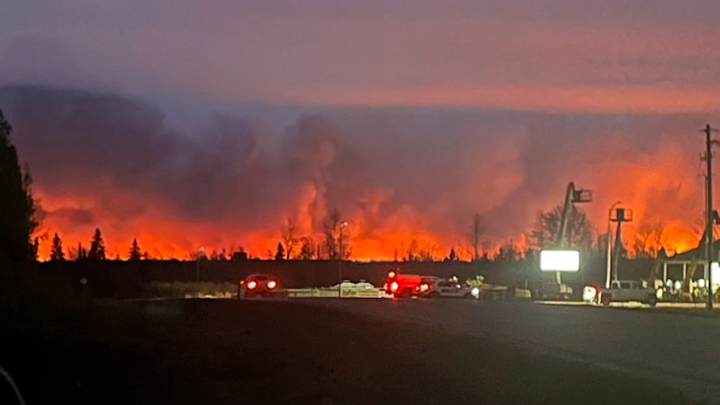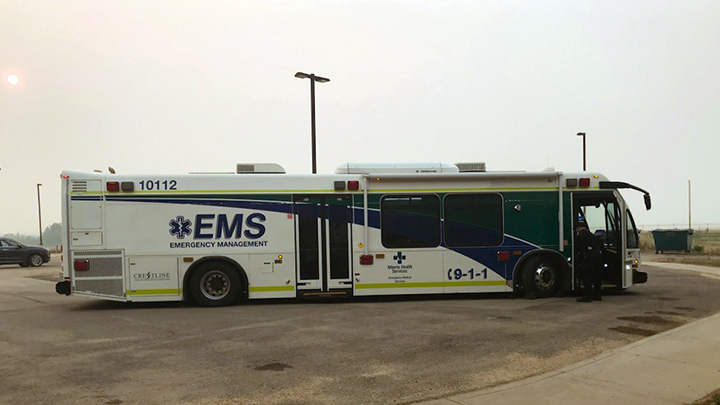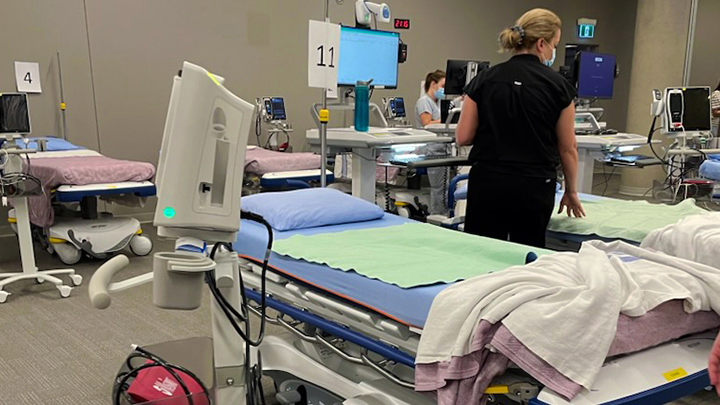
July 5, 2023

Wildfire flames were visible from the highway as Valleyview Health Centre evacuated to Grande Prairie in May. Photo by Tracy Brown.


Staff at Grande Prairie Regional Hospital converted their auditorium space into a staging area for incoming evacuees. Photo by Tracy Brown.
Story by Sara Blake | Photos by Tracy Brown
GRANDE PRAIRIE — As a regional healthcare site, it’s not unusual for Grande Prairie Regional Hospital (GPRH) to regularly see patients from throughout northwestern Alberta and beyond. It is rather unusual, however, to have several regional communities evacuated due to wildfire risk, all at the same time.
In May, the new hospital played a unique role in Alberta Health Services’ (AHS) wildfire response, as staff aided in the evacuations and relocation of patients and continuing care residents from various threatened communities.
“We were happy to be able to contribute to the wildfire response at GPRH by serving as a temporary staging area for nearly 100 patients and continuing care residents who needed to leave their home sites due to encroaching wildfires,” says Candice Edey, AHS Senior Operating Officer for Grande Prairie.
Sites evacuated to GPRH included the JB Woods Continuing Care Centre and High Prairie Health Complex as well as the South Valley Continuing Care Centre and Valleyview Health Centre. In addition, Grande Prairie’s Mackenzie Place Continuing Care Centre hosted continuing care residents from Edson. Several patients and continuing care residents were also relocated from McLennan.
“We are immensely proud and grateful for our staff who quickly came together to help manage the sudden influx of patients and ensure everyone was properly cared for,” adds Edey.
Nursing staff, physicians, pharmacy staff, porters, patient registration staff, managers and others were among those who took on extra shifts to assist with the additional GPRH guests.
Once at GPRH and out of immediate danger, displaced patients and residents were then temporarily relocated to appropriate healthcare facilities elsewhere in the province to be cared for until evacuation orders were lifted, and their home sites were ready for repatriations.
EMS played a significant role as well, transporting patients out of harm’s way and then returning them to their communities, once safe to do so.
“Two patient transport buses and four ground ambulances were relocated to the region,” says Rob Barone, AHS Associate Executive Director, North Zone EMS. “The buses have the capacity to safely move up to 20 patients of varying acuity, depending on the configuration required at the time. They were dispatched to different communities as required or in preparation for possible healthcare centre evacuations or repatriations.” Allied Health teams also supported the transport of patients and residents through the use of Recreation Therapy buses during the evacuations.
AHS continues to closely monitor the wildfire situation across the North Zone, through the North Zone Emergency Operations Centre. This multi-disciplinary group is assisted by AHS’ Emergency Disaster Management team — which liaises with municipalities, Indigenous communities and other partners to assess risk — while also working to return healthcare services to these areas once safe and appropriate to do so.
“Unfortunately, AHS and particularly our North Zone teams have had a lot of practice evacuating healthcare centres,” says Russ Nelson, AHS Director of Emergency and Disaster Management for the North Zone.
“Each situation is different, and we learn something new, which then helps us improve our processes for the next time,” he adds. “Things like streamlining communication channels to labeling of personal healthcare equipment like wheelchairs.
“In each scenario, we always do our best to provide safe, quality care to our patients, residents and their families, as we strive to limit the impact of these types of situations, as much as we can.”
Everyone deals with stress differently. Evacuations and returning home afterwards can be a particularly difficult experience. If you need to talk, supports are available 24/7 through the Mental Health Helpline at 1-877-303-2642, the Addiction Helpline at 1-866-332-2322, or Health Link at 811.
Online mental health resources can be found at ahs.ca/helpintoughtimes. A wide variety of wildfire resources for Albertans are also available at ahs.ca/wildfire, including mental health, air quality information and emergency planning links.